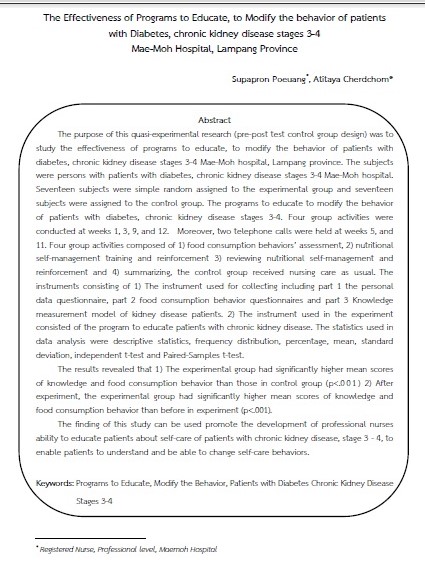ประสิทธิผลของโปรแกรมการให้ความรู้ เพื่อปรับเปลี่ยนพฤติกรรมผู้ป่วยโรคไตเรื้อรังเบาหวานระยะที่ 3 – 4 โรงพยาบาลแม่เมาะ
คำสำคัญ:
โปรแกรมการให้ความรู้, การปรับเปลี่ยนพฤติกรรม, โรคไตเรื้อรังเบาหวานระยะที่ 3 – 4บทคัดย่อ
บทคัดย่อ
การวิจัยครั้งนี้เป็นการวิจัยกึ่งทดลอง (Quasi-experimental research) ชนิดวัดก่อนและหลังแบบมีกลุ่มควบคุม (Pre-post test control group design) เพื่อศึกษาประสิทธิผลของโปรแกรมการให้ความรู้เพื่อปรับเปลี่ยนพฤติกรรมผู้ป่วยโรคไตเรื้อรังเบาหวานระยะที่ 3 – 4 กลุ่มตัวอย่างคือ ผู้ป่วยโรคไตเรื้อรังเบาหวานที่ได้รับการรักษาจากโรงพยาบาลแม่เมาะ สุ่มอย่างง่ายเข้ากลุ่มทดลอง 17 ราย และกลุ่มควบคุม 17 ราย โดยกลุ่มทดลองได้รับโปรแกรมการให้ความรู้เพื่อปรับเปลี่ยนพฤติกรรม ซึ่งประกอบด้วย การทำกิจกรรม 6 ครั้ง โดยมีกิจกรรมกลุ่ม 4 ครั้งในสัปดาห์ที่ 1, 3, 9 และ 12 โทรศัพท์ติดตาม 2 ครั้งในสัปดาห์ที่ 5 และ 11 ซึ่งกิจกรรมกลุ่ม 4 ครั้ง ประกอบด้วย 1) ประเมินพฤติกรรมการบริโภคอาหาร และเตรียมความพร้อม 2) ฝึกทักษะการจัดการตนเอง และให้แรงเสริม 3) ทบทวนการปฏิบัติการจัดการตนเองและให้แรงเสริม 4) สรุปสาระการเรียนรู้ และกลุ่มควบคุมได้รับการดูแลตามปกติ เครื่องมือที่ใช้ในการวิจัย ประกอบด้วย 1) เครื่องมือที่ใช้ในการเก็บรวบรวม ประกอบด้วย ส่วนที่ 1 แบบสอบถามข้อมูลส่วนบุคคล ส่วนที่ 2 แบบสอบถามพฤติกรรมการบริโภคอาหาร และ ส่วนที่ 3 แบบวัดความรู้ของผู้ป่วยโรคไตเรื้องรัง 2) เครื่องมือที่ใช้ในการทดลอง ประกอบด้วย โปรแกรมการให้ความรู้ผู้ป่วยโรคไตเรื้อรัง การวิเคราะห์ข้อมูล โดยใช้สถิติพรรณนา คือ การแจกแจงความถี่ ร้อยละ ค่าเฉลี่ย ส่วนเบี่ยงเบนมาตรฐาน วิเคราะห์เปรียบเทียบประสิทธิผลระหว่างกลุ่มโดยใช้สถิติอ้างอิงคือ (Independent t-test) และเปรียบก่อนและหลังในกลุ่มเดียวกันโดยใช้สถิติที (Paired-Samples t-test)
ผลการวิจัยพบว่า 1) คะแนนเฉลี่ยความรู้ และ พฤติกรรมการบริโภคอาหาร ของกลุ่มทดลองสูงกว่ากลุ่มควบคุมอย่างมีนัยสำคัญทางสถิติ (p<.001) และ 2) คะแนนเฉลี่ยความรู้ และ พฤติกรรมการบริโภคอาหาร ของกลุ่มทดลองหลังเข้าโปรแกรมสูงกว่าก่อนเข้าโปรแกรมการให้ความรู้ อย่างมีนัยสำคัญทางสถิติ (p<.001) ผลการวิจัยนี้สามารถนำไปส่งเสริมพัฒนาศักยภาพของพยาบาลวิชาชีพในการให้ความรู้ผู้ป่วยเกี่ยวกับการดูแลตนเองของผู้ป่วยโรคไตเรื้อรังเบาหวานระยะที่ 3-4 เพื่อให้ผู้ป่วยมีความรู้ความเข้าใจและสามารถเปลี่ยนพฤติกรรมการดูแลตนเองได้
เอกสารอ้างอิง
Bureau of Non-Communicable Disease Control Department, Ministry of Public Health. (2016). Operating manual for CKD reduction in chronic kidney disease in patients with diabetes and hypertension. Bangkok: Office of the Publishing Industry, Veterans Administration under the Royal Patronage. (in Thai)
Chuwong, G., & Sophonsuksathit, G. (2011). Effects of health education on self - care behaviors of chronic renal failure with hemodialysis patients. Journal of Health Science Research, 5(2), 41-50. (in Thai)
Health Education Division, Department of Health Service Support and Ministry of Public Health. (2018). Health education program to enhance health knowledge according to the National Health Act. Retrieved from https://hed.go. th/linkHed/374. (in Thai)
Jha, V., Garcia-Garcia, G., Iseki, K., Li, Z., Naicker, S., Plattner, B., ... & Yang, C. W. (2013). Chronic kidney disease: global dimension and perspectives. The Lancet, 382(9888), 260-272.
Kaewwanarat, A. (2017). Health teaching and counseling Retrieved from https://docs. google.com/viewer?a=v&pid=sites&srcid=YmNuYy5hYy50aHxhcGl2YW58Z3g6MWUzODRkMjNkYzUzNzNk. (in Thai)
Kanfer, F. (1991). Self-management methods. In F. Kanfer & A. Goldstein (Eds.), Helping People Change: A Textbook of Methods (4th ed.) (pp. 305-352). New York: Pergamon Press.
Kitcharoenchai, R. (2013). The Effectiveness of a nutritional self-management program on food consumption behaviors, HbA1C, and body mass index in persons with type 2 diabetes. (Master of Nursing Science Program in Adult Nursing). Graduate School, Burapa University. (in Thai)
Mahali, S., Ruksin, S., & Akkun, T. (2016). Effectiveness of health education program in self-care of chronic kidney disease (CKD) among chronic kidney disease patients at tambon health promoting hospital, Namyuen District, Ubon Ratchathani Province. Journal of Graduate School Pitchayatat, 11(1), 99-106. (in Thai)
Nimmanit, S. (2019). Diabetic kidney disease. Retrieved from https://www.si.mahidol.ac.th/ sidoctor/e-pl/ad min/article_ files /316_1.pdf. (in Thai)
Ongsuriyanondh, S. (2008). Self-care behavior development among chronic renal disease patients, Chaoprayayomraj Hospital, Suphanburi Province. Journal of Public Health and Development, 6(1), 32-38. (in Thai)
Pichaiwong, W. (2015). Diabetes chronic kidney disease. Journal of the Department of Medical Services, 1(-), 19-24. (in Thai)
Promnoi,C.,Promtape, N., & Tasaneesuwan,S.(2012). Critical thinking ability among senior nursing students faculty of nursing, Prince of Songkla University. The Songklanagarind Journal of Nursing. 32(3), 1-12. (in Thai)
Reungdit, B., Urairat,S., & Samaair, S. (2016). Development of self-care behaviors for patients with chronic kidney disease In Songkhla Hospital’s contracted unit of primary care. The Southern College Network Journal of Nursing and Public Health, 3(3),194-207. (in Thai)
Sa-ard, S. (2015). Development of health education model using by self directed learning media for chronic patients. Academic Services Journal Prince of Songkla University, 26(2), 41-49. (in Thai)
Samarpan Kidney Foundation. (2016). Advice for care and treatment of kidney disease. Bangkok: Samarpan Kidney Foundation. (in Thai)
Soivong, P. (2017). Medicine of nursing. Chiang Mai: Publications and Packaging, Smart Coatings and Service. (in Thai)
Sukhothai Thammathirat Open University Faculty of Nursing. (2011). Teaching documents for academic and adult nursing units, units 1-5. Ed12. Nonthaburi: Sukhothai Thammathirat Open University. (in Thai)
Thanakitjaru, P. (2015). Current situation of chronic kidney disease in Thailand. Journal of the Department of Medical Services, 1(-), 5-18. (in Thai)
The Nephrology Society of Thailand. (2012). Practice guidelines for chronic kidney disease before renal replacement therapy, 2009. Bangkok: Beringer, Ingelheim. (in Thai)
The Nephrology Society of Thailand and National Health Security Office. (2012). Manual for the management of early stage chronic kidney disease patients. Bangkok: Union Ultra Violet Co., Ltd. (in Thai)
Thomas, R., Kanso, A., & Sedor, J. R. (2008). Chronic kidney disease and its complications.
Primary care: Clinics in office practice, 35(2), 329-344.
U.S. Renal Data System. (2013). USRDS 2013 Annual data report: Atlas of chronic kidney disease and end-stage renal disease in the United States. National Institutes of Health, National Institute of Diabetes and Digestive and Kidney Diseases, Bethesda, MD, 2013.

ดาวน์โหลด
เผยแพร่แล้ว
ฉบับ
ประเภทบทความ
สัญญาอนุญาต
บทความ ข้อมูล เนื้อหา รูปภาพ ฯลฯ ที่ได้รับการตีพิมพ์ในวารสารวารสารวิชาการสุขภาพภาคเหนือ ถือเป็นลิขสิทธิ์ของวารสารวารสารวิชาการสุขภาพภาคเหนือ หากบุคคลหรือหน่วยงานใดต้องการนำทั้งหมดหรือส่วนหนึ่งส่วนใดไปเผยแพร่ต่อหรือเพื่อกระทำการใดๆ จะต้องได้รับอนุญาตเป็นลายลักอักษรจากวารสารวารสารวิชาการสุขภาพภาคเหนือก่อนเท่านั้น
เนื้อหาและข้อมูลในบทความที่ลงตีพิมพ์ในวารสารวิชาการสุขภาพภาคเหนือถือเป็นข้อคิดเห็นและความรับผิดชอบของผู้เขียนบทความโดยตรงซึ่งกองบรรณาธิการวารสาร ไม่จำเป็นต้องเห็นด้วย หรือร่วมรับผิดชอบใดๆ
อนึ่ง ข้อความและข้อคิดเห็นต่างๆ เป็นของผู้เขียนบทความนั้นๆ ไม่ถือเป็นความเห็นของวารสารฯ และวารสารฯ ไม่จำเป็นต้องเห็นด้วยกับข้อความและข้อคิดเห็นใดๆ ของผู้เขียน วารสารฯ ขอสงวนสิทธิ์ในการพิจารณาตีพิมพ์ตามความเหมาะสม รวมทั้งการตรวจทานแก้ไขหรือขัดเกลาภาษาให้ถูกต้องตามเกณฑ์ที่กำหนด


